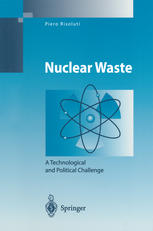

Most ebook files are in PDF format, so you can easily read them using various software such as Foxit Reader or directly on the Google Chrome browser.
Some ebook files are released by publishers in other formats such as .awz, .mobi, .epub, .fb2, etc. You may need to install specific software to read these formats on mobile/PC, such as Calibre.
Please read the tutorial at this link: https://ebookbell.com/faq
We offer FREE conversion to the popular formats you request; however, this may take some time. Therefore, right after payment, please email us, and we will try to provide the service as quickly as possible.
For some exceptional file formats or broken links (if any), please refrain from opening any disputes. Instead, email us first, and we will try to assist within a maximum of 6 hours.
EbookBell Team

0.0
0 reviewsDisposal of the wastes produced by the peaceful applications of nuclear energy is commonly perceived as one of the most complex environmental problems of our time. Evidence of this concern is seen in the difficulties encountered in selecting suitable sites for final repositories for this waste – difficulties that critically affect the whole issue of the social acceptance of nuclear energy.
Nevertheless, science and technology are able today to provide safe and reliable solutions for the disposal of nuclear waste, much more so than for any other hazardous by-product of industrial activities.
This discrepancy between public perception and actual technological achievements is largely the result of a disinformation campaign perpetuated for almost a quarter of century by antinuclear activists. This has been compounded by the lack of an effective response from scientists and engineers involved in waste management, many of whom, especially after Chernobyl, did not feel comfortable speaking out in public in defence of the technology that they had developed.
This book tries to explain the origin of the negative public perception of nuclear energy and introduces the most significant worldwide technical achievements in nuclear waste disposal.